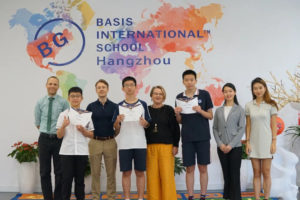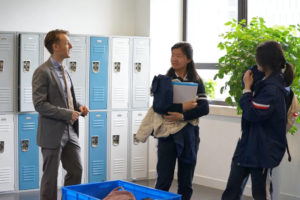From the UK to BASIS China: Transition, Support, Similarities and Differences
In the late January 2017 I was invited to interview with BASIS International Schools at a London recruitment event. Coming to the end of my current contract, the dark British winter, Brexit economic malaise, and usual New Year resolution drive, made their offer of being involved in founding American international schools in sunny south China timely and attractive.
A short due diligence search turned up the high academic standing of BASIS Charter schools in America, and also led me to the College Board Advanced Placement curriculum, the external examinations board that BASIS high schools work towards. Having taught the British GCSE and A-level history curriculum in the UK, AP World History and AP European History courses were both well within my purview, but also presented interesting differences in scope and content. College Board Course and Exam Description documents are detailed and accessible, so having reviewed these along with past exam papers, I felt confident in making the transition from teaching British curriculum to the AP-infused BASIS Curriculum.
July 2017: onboarding begins with Summer Institute Training for new starters, which at that time was still conducted in Phoenix, Arizona. (It is now conducted on-site in China.) Summer Training remains a key part of the transition into the BASIS Curriculum Schools network, and balanced a range of sessions on curriculum training from experienced Subject Expert Teachers, alongside introduction to school systems, plus opportunities for guided discussion on network culture, and the Chinese context. In terms of learning the new curriculum, working with teachers experienced in the classes I would be taking on was most helpful; particularly backwards planning a whole year scope and sequence, supported by sharing of resources, and chances to co-plan with other new starters recruited to sister schools. Later in the Autumn of 2017, BASIS International Schools covered fees and expenses to complete the College Board’s certified AP World History training, a three-day event led by a College Board trainer run as a workshop format with teachers from a range of schools, particularly focusing on understanding exam requirements. In subsequent years, BASIS International Schools has consistently covered expenses for College Board certifications, including most recently a 5-day training on the college research skills style course, AP Seminar.
In terms of similarities and differences between British curriculum and the BASIS Curriculum, there is significant overlap across most core subjects, though it is advisable to check specifically on your subject. In the Middle School (Grades 6 – 8) students work on what are effectively AP-preparatory courses, aligned to an extent with the US Common Core curriculum accelerated by two years on average, before transitioning in High School to a more AP-heavy load. It is not uncommon for BASIS International Schools, China students to take from four to eight AP courses per year, though even the most able students are advised to take no more than twelve AP courses in total throughout high school. One major difference between APs and A-levels is that APs tend to emphasize breadth rather than depth to an extent, and as a result around 50% of exam grades are based on completion of multiple choice questions, though the remainder of the assessment is based on free-response writing. Noting the above differences, good pedagogy from UK teacher training transitions well into BASIS classrooms. Good and Outstanding teachers will find their students do well, and that tried and tested techniques from UK classrooms lead to success across curriculums.
Being at BASIS: Appreciation, Career Growth, Benefits
Having worked with BASIS International Schools, China now for a little over four years, I have deeply appreciated the students, network leadership, and career opportunities. Having been part of the founding team at BASIS International School Guangzhou (next to Hong Kong) and BASIS International School Hangzhou (next to Shanghai), and visited the other campuses across China, I cannot emphasize enough how inspiring the students are. There is a deep respect and interest in education, with students pushing themselves to make the most of what our schools can offer. One of the students I taught AP World History to in 2017 recently received their Early Decision offer to Princeton, and each day student after student impresses me with some drive or interest one rarely encounters elsewhere: students with patents on inventions; published research papers; professionally produced commercial music albums; winners of global science competitions. Even the weakest students in certain classes would be considered a strong contender elsewhere, for example in BASIS International School Hangzhou the less academically confident first graduates have all secured offers from top Russel Group universities.

Dr. James with 2021 BASIS Global Scholarship Award recipients
Importantly, during 2020 and through the ongoing COVID pandemic, network leadership in BASIS International Schools, China has been strong and supportive. At a time when some other international schools were facing financial difficulties, BASIS staff received significant wellness bonuses. There is a genuine ethos of caring for staff, and nurturing teachers, in the belief that this allows staff to perform to their best in the classroom. Teachers are not typically scheduled for more than four or five classes per day, typically across two classes or grades; significant care and attention is given to practicalities of life such as housing and healthcare; whilst the work culture fostered is one of positivity and development.
For UK teachers, teaching the BASIS Curriculum has the advantage of opening up understanding of a US-based curriculum and globally recognized assessment system. Whilst non-exam classes teach the bespoke BASIS Curriculum, this to a large extent gives familiarity with the US Common Core, albeit accelerated by around two grade levels. Additionally, at different grade levels, teachers receive training and experience across a range of internationally recognized programs, including the International Schools Assessment aligned with PISA frameworks; NWEA’s MAP Growth assessments; as well as PSAT/SAT and AP exams. With UK and US international schools dominating much of the global education market, familiarity and experience in both systems adds significant value, and greatly broadens future career prospects.

In my own experience, BASIS International Schools, China offers excellent career opportunities, both in terms of expanding one’s teaching repertoire, and opportunities to take on Middle to Senior Leadership roles. When first hired in 2017-18 as part of the founding team for BASIS International School Guangzhou, my role was as an AP World History teacher and “Curriculum Consultant” for Humanities, something akin to a Curriculum Lead role. In 2018-19, I moved internally to become a part of the founding team of BASIS International School Hangzhou, taking a Middle Leadership role building the Middle and High School program. Over the last few years I have served as Director of the Middle and High School, before transitioning full time over to Head of High School in 2021-22, as the High School has grown to its full size. Throughout BASIS China schools, Middle and Senior Leadership positions are filled equally by high quality, headhunted talent, and by internal promotions of classroom teachers. Thanks to the rapidly growing nature of BASIS China schools, leadership roles come up regularly due to expansion, and UK teacher training, with its strong emphasis on curriculum planning, data usage, as well as maintenance of professional relationships, gives a solid foundation for application.
Significantly, such career growth opportunity goes alongside quality Continued Professional Development. All staff have an annual CPD budget from $500 – 1500, beyond core network training, which is allocated at staff discretion, with administration support finding in-school mentors and optional off-timetable time where appropriate. I have colleagues completing everything from iPGCEs, to various Masters, to PhDs in Education. By comparison, in the UK sector, access to NPQ Middle Leadership training remains restricted and sadly underfunded. In my own case, I am slowly but surely completing the final modules of a Masters in Education Leadership, as well as the 18-month UK Department for Education NPQ in Senior Leadership. Taken alongside classroom experience in alternate curriculums, as well as the various leadership opportunities, access to funding and time to complete such qualifications has accelerated my career trajectory by at least ten years.
Finally, benefits packages and bonuses are very generous, sitting towards the top of the international schools market pay scale. With major expenses such as housing, travel, and health care, etc. covered, coupled with the comparatively lower cost of living in China, it is not unusual for staff to be able to save and invest 70 – 80% of their take home salary, whilst enjoying life. Discussion with peers who have made the move to BASIS China from the UK is that one contract year is easily sufficient to save for a house deposit, whilst a full two to three year contract package would make a decade pluses dent in an average mortgage. Perhaps unsurprisingly, one of the common staff room topics among settled staff tends to be investments, which evidences the strength of remuneration offered.
In summary, for myself and other British colleagues, the transition from UK to BASIS Curriculum typically proves to be smooth, thanks both to a good level of alignment in terms of skills and content, as well as the high level of support provided by BASIS China schools. For teachers across career levels, there are significant clear benefits to teaching the BASIS Curriculum: valuable experience in US and international teaching frameworks, and structured, funded Professional Development opportunities which allow meaningfully facilitated advancement. Perhaps of most relevance, the BASIS China network is incredibly supportive of its expat teachers and families, with an expectation that BASIS school teams go above and beyond to care for wellbeing of staff.

Dr. Bryn James is the Head of High School at BASIS International School Hangzhou.
Visit our careers website for more information about teaching opportunities with BASIS International Schools.
Join us for a live in-person information session in London on February 18th at 6 p.m. at the Hilton Paddington to learn more from our recruiting team. Email careers@basisinternationalschools.com for more details.